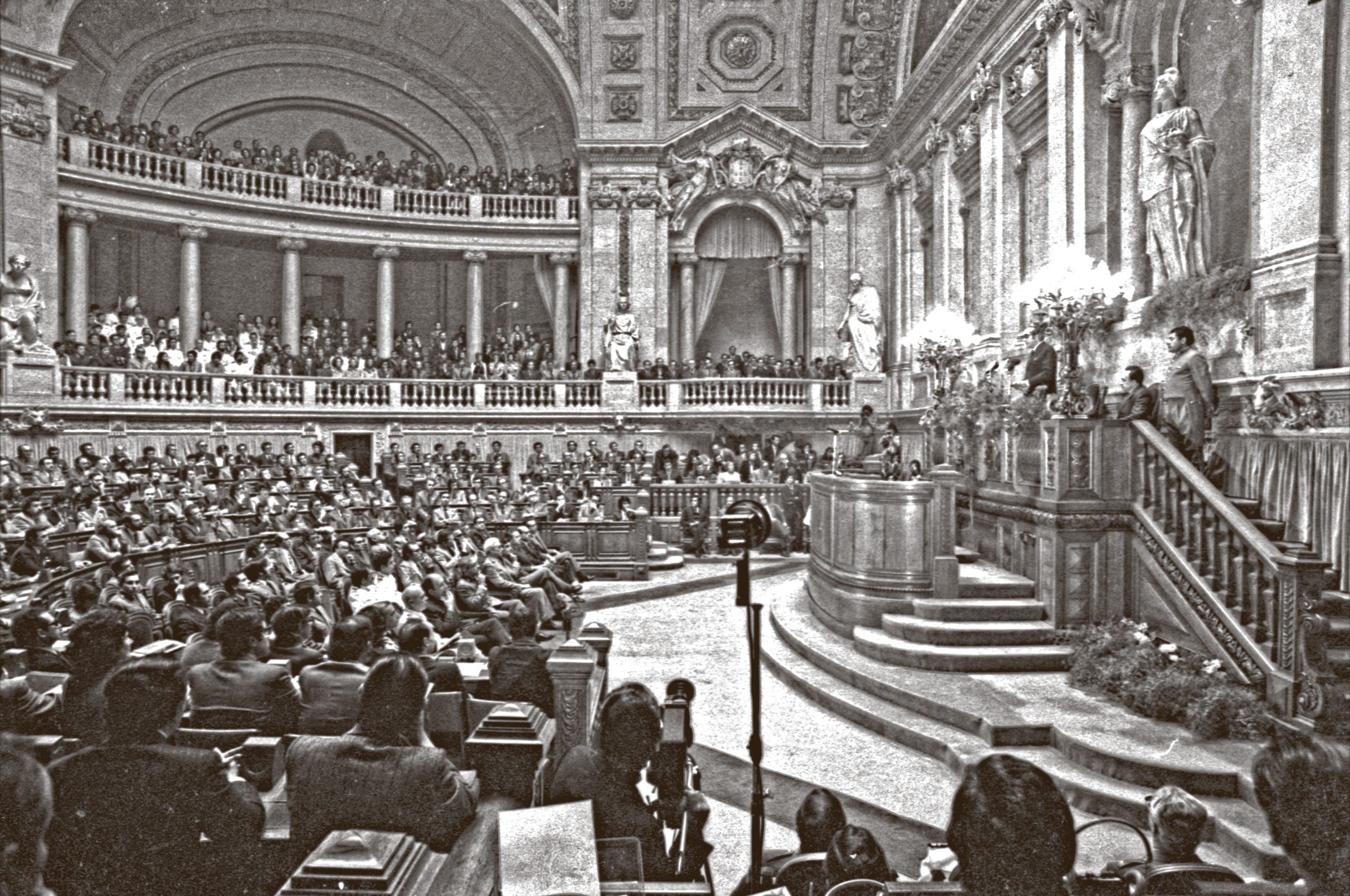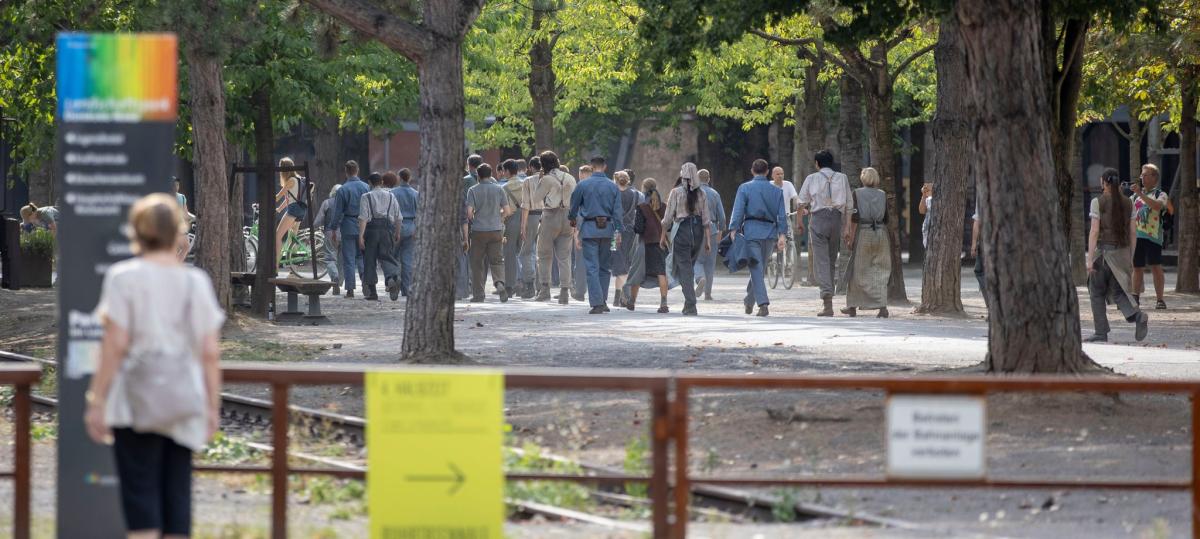Constituent. The Assembly that made the Constitution began 50 years ago

‘Four moments of the constituent ‘
The President of the Republic highlights the discourse of Mário Sottomayor Cardia (PS) advancing with the MFA/parties pact as one of the most relevant so that the deputies could have completed the work.
By Marcelo Rebelo de Sousa
Ask me Rachel Abecasis an episode of the Constituent Assembly elected fifty years ago. A constituent assembly elected in the middle of revolution – in its flow, that is, radicalization – that lives almost a year with this revolution, and ends with it, in reflux and end, has no, but hundreds of important moments.
I decided to choose four from all of them, as they marked particularly important moments for the lives of four parties – the largest – and the constituent itself.
First moment.
Parties to the right of the PCP decided, right in the debate and vote of the Regimentapprove the existence of a period before the agendato discuss the political context that framed the future constitution.
That is, against the position of the PCP, MDP/CDE and UDP, the majority PS-PPD-CDs converted the constituent into a critical forum regarding the course of the revolution.
The PCP started to abandon the hemiciclo of São Bento while the period before the agenda, just returning at its end.
Would be MDP/CDE and UDP.
Until, one day, understanding that he lost more than he earned from the absence, he returned to stay and participate in the controversy on the revolution.
And that moment meant, without saying, that the revolutionary flow had become reflux.
The Constitution had won and the revolution had lost.
Second moment.
After the revolutionary flow and reflux, the end of summer and transition to the autumn of 1975 began was a very busy time. Some feel the ground fleeing under their feet, others affirming the growing of their power, in the MFA and the party universe.
All culminating in November 25th.
It is then in this tide that Mário Sottomayor Cardia has its exceptional speech in the podium, advancing with the proposal of a new MFA-pact and explaining that, if necessary, the Constituent Assembly would continue to work outside Sao Bento and outside Lisbon. It was not necessary, but many, perhaps most of the constituents of the PS, PPD and CDs arrived from Porto. I went to those who stayed in Lisbon, to ensure the presence in the Constituent and the Express.
Cardia’s speech was one of the most relevant of the entire Constituent.
And he cleanedly marked who would win the elections and win the Revolution – the Socialist Party. It would be the civil winner of the revolution and the Constitution and, in it, Mario Soares.
Third moment.
Eve of the global final vote.
The PPD had lost, by split, almost half of its bench, which had left on the left.
You have to decide how the Constitution will vote.
Most understand that it should approve, by the constitution’s victory over the revolution, for the sum of achievement in fundamental rights and the organization of political power, and not to leave the total victory to the left – PS, which had approved rights and political organization with the right and economic and social organization with the left – as well as other left -wing parties, which they would want to assume as their global success.
A minority of the PPD parliamentary group apparently prefers to equate the vote against.
Francisco Sá Carneiro, this night of the eve, in a JSD rally, of course: the PPD should not only approve the Constitution, but to proclaim to be a great victory of yours.
Tactical-strategic step that would repeat, months later, by assuming the candidacy of António Ramalho Eanes as, primarily, yours, too.
And so, the vote of the PPD was unanimous – in favor of the Constitution, with the additional conviction added by the historical leader, returned to leadership, in a more moderate stance, that is, to the right, than that of his party, when, almost a year earlier, he had begun the constituent process with the PS. And the PPD has won its central role, so useful for the future, immediate and mediate.
Fourth moment.
Instant of the global final vote.
April 2, 1976. The unanimous vote seems likely.
The CDs had voted, more or less, such as the PPD, throughout the process.
Well kept secret.
The CDs would vote against.
Widespread dirt.
And yet this last-minute secret would be worth the CDs to keep him as a barrier, delimiting to the right, the border between democracy and non-democracy.
It would be worth decades, in which, to his right, no political force would take revenge with each other and this, then insurmountable wall.
Four defining moments.
One – the beginning of the constitution’s victory over the revolution. And retreat from the PCP.
Another – that of the effective victory of the Constitution and the consummation of the end of the revolution. With PS and Mário Soares winning.
Third – the PPD option for the conquest of the center, and even the left center, culminating, ten years ago, in the majorities of Cavaco Silva.
Fourth and last – the choice of CDS on the right, keeping the ‘rigorously downtown’ speech, but ensuring that your right, for three decades, or a little more, there would be no one.
Palace of Belém, April 21, 2025
President of the Republic, former PPD deputy
It was a pride
Carvalho Arons is still amazed at being one of the youngest chosen to make the constitution.
By Alberto Arons de Carvalho
When, in the early 1970s, during the governance of Marcelo Caetano, I decided to watch a session of the National Assembly, I was far from imagining that, a few years later, I would sit in the place where those deputies were, whose performance, without surprising me, had so disappointed by the total absence of plurality of opinions, replaced by a ceremonious, almost always panegyric speech.
After all, just over a year after April 25, surely one of the most important dates of my life, there was one of the youngest deputies, to live with figures from various political quadrants, who admired so much, from some brave fighters against the deposed regime and political prisoners to eminent jurists and teachers from the University of Lisbon, where I had just licensed.
Experience as a constituent deputy was stimulating. Not just for participating – and so much learning… – in the elaboration of the founding text of Portuguese democracy. But also for witnessing the debate of ideas, so often so contradictory, as well as being able to contribute to the writing of that text. And for assisting in person and participating in the definition of basic but fundamental aspects of the new parliamentary framework in democracy: where did different parliamentary groups sit? And what facilities did you have in the building? How was the elaboration of the text of the Constitution in plenary and commissions? How long could the intervention of each deputy last? Would there or be there a period before the agenda where the deputies could analyze the political situation?
The enriching experience of a constituent deputy, who sought to reconcile with the leadership of socialist youth, would, however, end on October 21, 1975, when, after completing the debates and writing of the articles of the Constitution, I decided to interrupt the parliamentary activity to embrace a new journalistic project that succeeded the Republic – the newspaper A Fight.
Former PS deputy
It was a lot of backstage work
Carlos Brito recalls that the leaders were busy and it was the deputies who did the work.
by Carlos Brito
The holding of free elections for a constituent assembly, within a year, was one of the concrete commitments that the MFA military made with the Portuguese people by overthrowing the government of fascist dictatorship on April 25, 1974. It is said, by beginning these lines, which was a fully honorable commitment, with the elections, now 50 years ago.
It was in this very crispted transition climate that the Constituent Assembly began its work and continued them in the first phase. Internally, the great oratory controversies dominated the sessions and left nothing to the Constitution; In the external plane, it was wrong to become the target of social contestations and claims, which culminated, in their siege for dozens of thousands of construction workers.
In a second phase, parliamentary groups were progressively assuming the patriotic mandate of which they were invested. The directions of the PS, PCP, PPD and MDP benches were able to understand and cooperate in a consensual work plan and organize deputies in order to make a constitutional text within the period. The CDs made systematic ideological opposition. Even UDP has improved. At large periods, the deputies worked freely, taking as guidance the projects of constitution of their parties, which were quite advanced. The maximum leaders of the parties were involved in the struggle of positions and the political battles of everyday life.
It was a surprise to them when the deputies ended and presented them with their work. Álvaro Cunhal gave him very positive grade. Until seeing I didn’t believe that party composition of the Assembly produced things. Became a great defender of the Constitution. Mario Soares, with his party pride, proclaimed: This is the great job of the PS! Sá Carneiro, without meeting the benefit of his deputies, raised: he is a Marxist Constitution.
There was no contested PPD leader here, he launched himself in a conspiracy with right-wing military and leaders so that the constitutional text was not promulgated and previously subjected to referendum.
To contain and empty this conspiracy then the power of the true winners of November 25 was stated: Costa Gomes, Ramalho Eanes and the nine.
In an unprecedented, revolutionary act, on April 2, a date set for the final voting of the constitutional text, the President of the Republic, Costa Gomes, moved from Belém to S.Bento and as soon as the deputies completed the vote, approving it, signed the promulgation of the Constitution, at the Constituent Assembly table itself. Without further obstacles, it entered into force on April 25, 1976, two
Years after the inaugural day of the revolution.
Former PCP deputy








